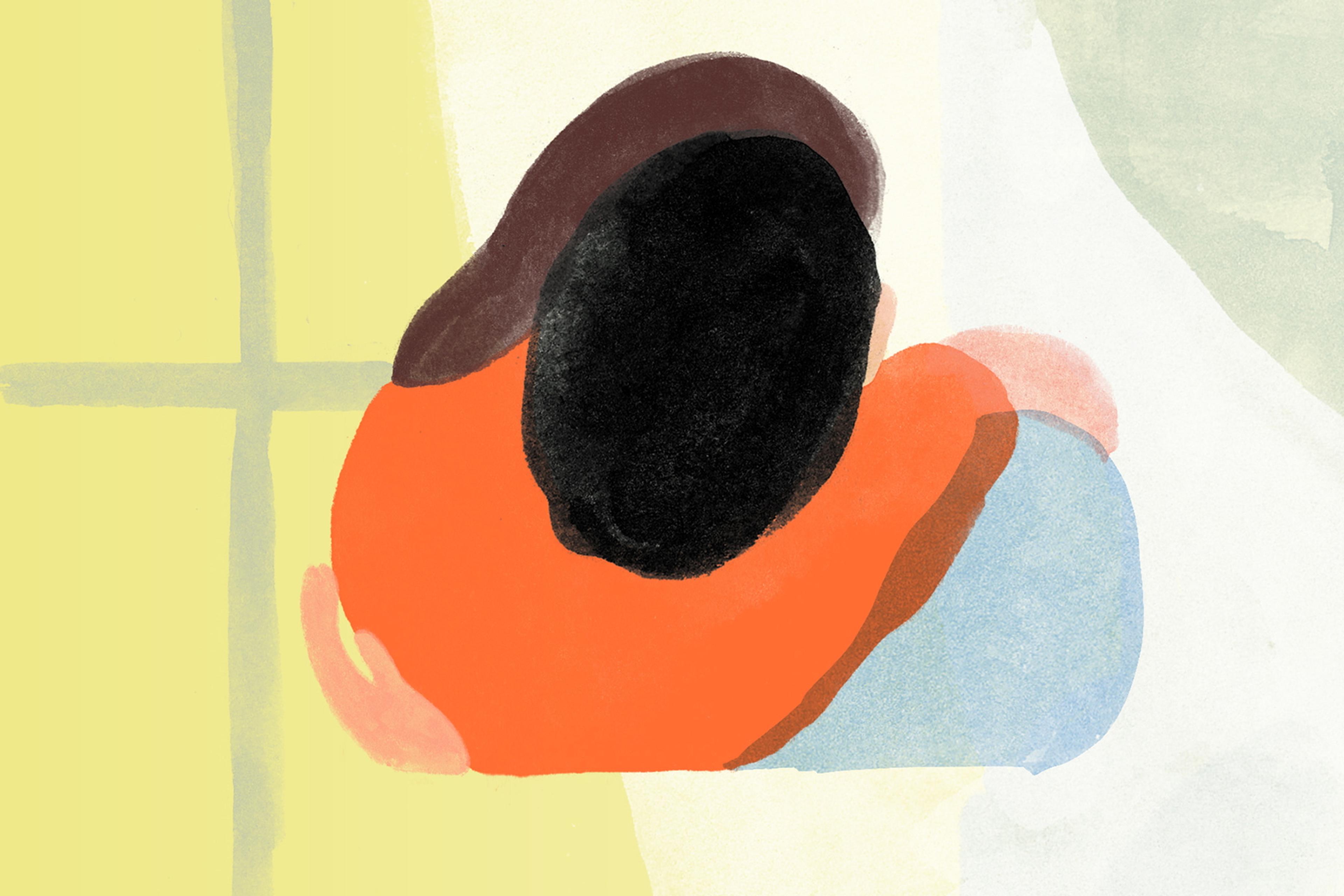When John came to McLean Hospital for treatment, most of our team was convinced he would kill himself. As a middle-aged white man with severe and chronic depression, significant physical pain, easy access to firearms, a long history of substance misuse, and childhood sexual abuse, he checked almost every box on the list of risk factors for suicide. Furthermore, John (my patients’ names and details have been changed to protect privacy) reported passive suicidal ideation – fleeting thoughts that he would be better off dead than alive. However, John did not attempt suicide during or after his care. He never developed a plan to end his life. Despite his mood struggles and incredible physical discomfort, he remained staunchly committed to living for as long as possible. When I asked John why he wasn’t more suicidal, he answered simply: ‘I could never do that, because I believe in God.’
Suicide is a global epidemic: according to the World Health Organization, approximately 700,000 people take their own lives each year, which amounts to 1 per cent of all global deaths annually. Suicide rates are particularly high in the United States, where it is one of the leading causes of death among adolescents and young adults (under age 35).
Three of the chief factors that protect against suicide, according to the American Foundation for Suicide Prevention, are access to mental health care; a sense of connection to family/community support; and ‘cultural and religious beliefs that … discourage suicidal behaviour, or create a strong sense of purpose or self-esteem’.
Of these factors, the first two have received the most attention, but not because they are more protective than the third. Many of those who attempt suicide have recently received professional mental health care and, by one estimate, social support confers just a 7 per cent reduction in suicide risk. By contrast, a study led by my colleague Tyler VanderWeele – involving nearly 90,000 women who were followed for around two decades – found that those who attended religious services weekly were five times less likely to die from suicide compared with those who did not attend at all. In a similar study among some 100,000 men and women, weekly service attendance predicted 68 per cent lower risk of ‘deaths of despair’ (suicide, drugs and alcohol) among females, and 33 per cent lower risk among males.
These are not isolated findings. A 2016 systematic review of the literature located 89 studies on religion and suicide published in the preceding years. The authors concluded unequivocally that religious affiliation protects against suicide attempts with large effect sizes, even after controlling for social support and access to mental health care.
Certain aspects of spirituality and religion can even confer protection against suicidality for non-religious individuals. In one recent study that my programme conducted among participants with chronic mood disorders, belief and faith in God were associated with substantially lower suicidality even among the religiously unaffiliated. While this particular investigation was specific to older adults, none of my previous research has suggested that effects of religion on suicide risk vary with age. I have also not observed that effects are more pronounced within specific faith groups or religious sects, relative to others.
What might account for these trends? First, the best-known predictor of suicide is hopelessness. When people lose hope in a brighter future, they are more prone to taking their lives. Spirituality can help prevent suicidal behaviour by promoting faith and hope. Several years ago, my colleagues and I identified that acute psychiatric patients with depression were significantly more likely to benefit from cognitive and dialectical behaviour therapy if they believed in God. More centrally, we found that belief in God predicted greater belief in treatment and hope that one would eventually get better. Faith in God facilitates the belief that things can improve, even when people are at a low point in life.
Another key predictor of suicide is impulsivity. A surprisingly high number of suicide attempts occur suddenly: one study found that more than 40 per cent of attempts had manifested within 10 minutes of someone deciding to take their life. Religion can help prevent suicide by promoting self-control, since religious beliefs and values tend to create a buffer against prepotent or spontaneous thoughts and urges. To put it another way: when someone has an impulse to act in a certain manner, religious beliefs and doctrines can serve as a filter or buffer to determine whether that behaviour is in line with higher-order values. Clinically speaking, for religious patients who experience urges to use alcohol or drugs, gamble, or harm themselves, faith-based creeds and proscriptions can be protective factors. Granted, overburdensome religious practices can decrease happiness and promote shame and guilt in some cases – but, when it comes to impulsive behaviour and suicidality, religion has much to offer.
My favourite explanation for how spirituality and religion may protect against suicide originates from the work of Viktor Frankl – the Austrian psychiatrist who survived the Nazi concentration camps, and observed that having a sense of meaning and purpose is a key predictor of human wellbeing. When my patients perceive their anxiety, depression or other problems as being potentially constructive in their lives – when they view their struggles as an opportunity to grow in terms of self-awareness, connection with others, or resilience – they rarely (if ever) display significant suicidality. While this philosophical perspective is technically agnostic, in practice it often dovetails with and even emanates from spiritual and religious teachings.
Allow me to share a clinical anecdote about this. Rebecca was a deeply religious 27-year-old single female when she came to my office. Given her chronic loneliness, unemployment, and access to numerous lethal means of suicide, she was flagged as medium-to-high risk at the point of her intake.
Rebecca’s OCD involved a fear about her health: despite numerous neurology consultations and brain scans to the contrary, she was intractably preoccupied with a (false) obsession that she had a brain aneurysm, and that a spike in her blood pressure could prove fatal at any moment. Rebecca was so deeply anxious that she had stopped leaving her home almost completely. But she was never hopeless, impulsive or suicidal. When I asked her about this, Rebecca shared that her faith had taught her that all life struggles have a meaning and purpose that eventually become apparent. She therefore believed that, somehow, her OCD and depression could be catalysts for growth and thriving one day.
When we met for the first time, I told Rebecca about exposure therapy and explained that, in order to overcome her fears, she would need to face them head on. This included reading and watching videos about aneurysms, as well as getting Rebecca’s heart rate very high. Rebecca cried when I described the treatment, and at many points throughout our sessions, given the inherent stress of exposure therapy. But she exhibited incredible self-control, complying faithfully with each and every recommendation. Rebecca also attributed this to her faith: she believed that God had charged her with the task of overcoming her OCD and depression, so she was highly motivated.
Following her successful treatment, Rebecca eventually got married and settled into her life. Two years later, she called me with some news: she was pregnant! But before I could express my congratulations, she shared that her baby had a significant brain defect that was identified in utero, and he would need to have a dangerous surgery after delivery. Rebecca was concerned, but I marvelled at how calm she sounded over the phone. When her baby arrived, she was able to support him and the rest of her family through their harrowing ordeal. In the end, her baby survived, and he is healthy today. Shortly after the surgery, Rebecca called me again: ‘I told you that there was a meaning to my OCD! I was only able to make it through the past few months because of what I went through previously.’
Practically speaking, I do not suggest that my patients, or members of the general public, start praying or going to religious services in order to deal with suicidality. But I do think there needs to be broader recognition of the vast and deep protection that spirituality and religion provide against the suicide epidemic.
The scientific world in general, and the disciplines of behavioural health in particular, tend to be biased against matters of spirituality and religion. The existing literature is enough to show that these factors have large protective effects against suicide. If another variable had even half the value for any major public health concern, I suspect it would receive substantially more attention. I would humbly suggest that the suicide prevention webpages of organisations such as the National Institute of Mental Health, the Centers for Disease Control and Prevention and the American Psychiatric Association be updated to include prominent mention of the science highlighting religion as a protective factor.
Clinicians should also be encouraged to discuss spirituality and religion with all patients – not just those who are religiously affiliated. As I’ve noted, the protective value of this domain may translate beyond specific faith communities. Moreover, many unaffiliated individuals believe in God.
Finally, the combined mental health sciences could take a page out of religion’s playbook when it comes to dealing with suicidal patients. Yes, we should continue to use evidence-based approaches to reducing distress and symptoms. But we should also build up our patients’ resources through the avenues of hope, optimism and meaning-making. When this approach is taken, mental disorders often can become catalysts for thriving, and we can save lives.
In the US, the National Suicide Prevention Lifeline is 1-800-273-8255. Or text HOME to 741741 to reach Crisis Text Line.
In the UK and Ireland, the Samaritans can be contacted on 116 123 or email jo@samaritans.org or jo@samaritans.ie
In Australia, the crisis support service Lifeline is 13 11 14
Other international helplines can be found at www.befrienders.org
This Idea was made possible through the support of a grant to Aeon+Psyche from the John Templeton Foundation. The opinions expressed in this publication are those of the author and do not necessarily reflect the views of the Foundation. Funders to Aeon+Psyche are not involved in editorial decision-making.








